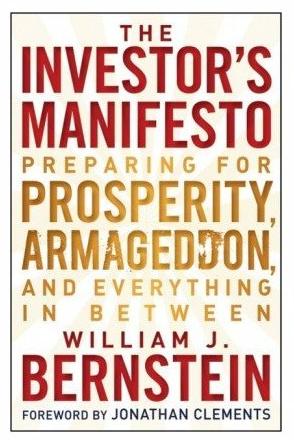The Investors Manifesto
This book was written after the financial meltdown in 2009 and as a result provides a realistic view on what to expect from investments. This book is highly recommended for learning more about investing, especially if you’re in your 20s and living in the United States. Some of the topics covered in this book include Risk vs Returns, the need for investing, Dollar Cost Averaging, Value Averaging, Expected Returns and Gordon’s Equation, Rebalancing, Asset Allocation and Emotional Discipline. My favorite topics from this book are on Asset Allocation and Emotional Discipline. This blog post is about the latter.

Emotional Discipline
It is one thing to acknowledge that you’re risk tolerant after reading the books and it is a completely different thing to watch losing 40% of your savings. We generally tend to over-estimate our risk tolerance and in this book, Bill Bernstein gives us some tips on dealing with bearish markets -
-
Financially Mature - If you’re in your 20s starting to invest, which one would you prefer among the following 2 scenarios -
Choice A: Stocks go up by quite a lot—and stay up for many years.
Choice B: Stocks go down by quite a lot—and stay down for many years.
The second option makes you more risk tolerant, gives you a lot of time early in your career to buy low and also the maturity in your 30s and 40s to look at a bullish market and say ‘I’ve seen this before and I know how this is going to end’.
The rosiest scenario for the young investor is a long, brutal bear market.
-
Dare to Be Dull - The purpose of investment is to avoid dying poor, not to get rich. Investing is purely for financial purpose rather than for entertainment. If you want excitement in your life, it is far safer and cheaper to take up skydiving than to seek it in your investment portfolio. Buying Twitter (TWTR) stocks is more cool and sexy than a Vanguard Bond Index. And for the same reason, people buy lottery tickets! Reminds me of this scene from the popular sitcom FRIENDS where Ross says he’ll invest the money from the lottery into a low yield bond.
-
Friends, Family and Media
-
Avoid constantly checking the stock prices, the financial news and the media - once or twice a week should be enough (Note to Self). If you find yourself doing this, get outside and spend time with your loved ones. If you need more money, work on side projects.
-
Do not discuss finance with friends or family during the bear market - best for everyone. I would recommend to not discuss the results even during the bullish times :)
-
-
Relish the Randomness
-
Never try to predict the market/future - Accept that there is no pattern in the financial market and you’re not better than an average investor. Stop making analogies.
-
Never forget the legendary investor John Templeton’s warning, that the four most expensive words in the English language are “This time it’s different.”
-
Further Reading
- Emotional Discipline - Your Money and Your Brain by Jason Zweig.
- Theory - A Random Walk Down Wall Street by Burton Malkiel.
- Business - Common Sense on Mutual Funds by Jack Bogle.
Kaushik Rangadurai
Code. Learn. Explore
